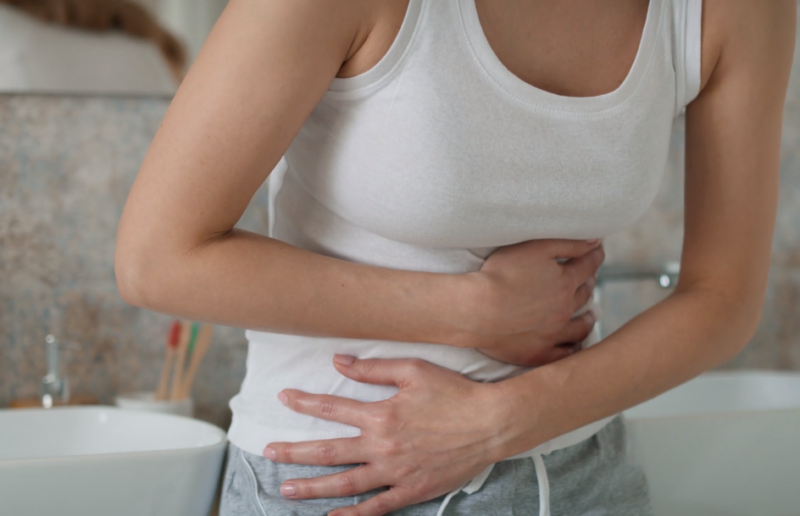Ovarian cysts, fluid-filled sacs that develop on or inside an ovary, are a common occurrence among women during their reproductive years. While many ovarian cysts are harmless and resolve on their own, they can sometimes cause discomfort, pain, and other health complications.
This comprehensive guide aims to explore natural treatment options for managing and potentially reducing ovarian cysts, offering a holistic approach to this common health issue.
How to Treat it Naturally
While ovarian cysts often resolve on their own, natural remedies can play a significant role in alleviating symptoms and promoting overall ovarian health. These remedies focus on dietary adjustments, herbal interventions, and lifestyle modifications, each contributing to a holistic approach to managing ovarian cysts.
Dietary Adjustments

Specific foods and dietary practices can assist in managing ovarian cyst symptoms:
- Cruciferous vegetables: Broccoli, cauliflower, and Brussels sprouts contain compounds that help in detoxifying excess hormones from the body.
- Green tea: Rich in antioxidants, green tea can reduce inflammation and may help in managing cysts.
- Apple cider vinegar: Some anecdotal evidence suggests that apple cider vinegar can help shrink and dissolve ovarian cysts due to its high potassium content.
Herbal Remedies

Numerous herbs have been traditionally used to support ovarian health and may be beneficial in managing cysts:
- Echinacea: Known for its immune-boosting properties, Echinacea can help the body fight off infections and encourage the healing of ovarian cysts.
- Milk thistle: This herb supports liver health, which is crucial for hormone balance and detoxification.
- Dandelion Root: Often used as a diuretic, dandelion root can help in reducing bloating and discomfort associated with ovarian cysts.
It’s important to remember that while herbal remedies can be helpful, they should be used under the guidance of a healthcare professional, especially for those with existing health conditions or those taking medication.
Lifestyle Modifications Revisited

In addition to stress management and sleep quality, other lifestyle changes can significantly impact ovarian health:
- Regular Exercise: Maintaining a regular exercise routine helps in balancing hormones and managing weight, both of which are important in preventing and managing ovarian cysts.
- Avoiding Toxins: Limiting exposure to environmental toxins like certain plastics, pesticides, and non-organic produce can help in reducing the burden on the liver and hormonal system.
Other Treatment Options
There are also non-dietary and non-herbal options to consider:
- Heat Therapy: Applying a warm compress or heating pad to the lower abdomen can help relieve pain associated with ovarian cysts.
- Acupuncture: This traditional Chinese medicine technique can help in balancing hormones and reducing pain.
- Massage Therapy: Focusing on the lower abdomen, massage can help improve circulation and reduce discomfort.
While natural treatments can be effective in managing symptoms and promoting healing, they are not a substitute for professional medical advice. It’s crucial to have regular check-ups and consult with a healthcare provider for the proper diagnosis and treatment of ovarian cysts, especially if symptoms persist or worsen.
Recognizing the Symptoms
Ovarian cysts often present a challenge in terms of diagnosis because they can exist without causing any noticeable symptoms, especially when they are small. However, as they grow, they may start to manifest various symptoms.
Being aware of these symptoms is crucial for early detection and management. Here’s a detailed look at the common symptoms associated with ovarian cysts:
Common Symptoms
- Pelvic Pain: This can range from a dull ache to sharp pains and may occur on the side of the ovary where the cyst is located. The pain might be constant or intermittent.
- Bloating or Swelling: Many women with ovarian cysts experience a feeling of fullness or heaviness in the abdomen.
- Pain During Intimacy: Painful intercourse, particularly with deep penetration, can be a symptom of an ovarian cyst.
- Irregular Menstrual Cycles: Ovarian cysts can affect menstrual regularity, leading to delayed, missed, or unusually heavy periods.
- Painful Bowel Movements or Urination: Large cysts can exert pressure on the bladder or bowel, causing pain or discomfort during urination or bowel movements.
- Breast Tenderness: Similar to symptoms experienced during a normal menstrual cycle, some women with ovarian cysts may notice increased breast tenderness.
Symptoms Indicating Emergency Medical Attention
Some symptoms are indicative of complications from ovarian cysts and require immediate medical attention:
- Sudden, Severe Abdominal Pain: This could signal a ruptured cyst or ovarian torsion, a serious condition where the ovary becomes twisted.
- Fever and Vomiting: Accompanying severe abdominal pain, these symptoms could indicate an infection or a ruptured cyst.
- Rapid Breathing or Dizziness: These symptoms, particularly if combined with severe pain, could suggest internal bleeding or shock, especially in the case of a ruptured cyst.
Importance of Symptom Awareness

Getting to know these symptoms can lead to early consultation and diagnosis. However, it’s crucial to remember that these symptoms can also be indicative of other medical conditions. Therefore, it is always advised to consult with a healthcare professional for an accurate diagnosis.
Women should also be aware that not all cysts will cause symptoms and some are often found during routine pelvic exams or ultrasounds for other reasons. Regular gynecological check-ups are therefore vital in the early detection and management of ovarian cysts, even in the absence of symptoms.
Long-Term Management
Managing ovarian health is a long-term commitment that involves a combination of lifestyle choices, regular medical check-ups, and being attentive to one’s body. Here are some key considerations:
Lifestyle and Diet
Maintaining a healthy lifestyle and a balanced diet is not just about managing existing cysts but also about preventing new ones. A lifestyle that includes regular exercise, a balanced diet, stress management, and avoiding harmful substances can contribute significantly to ovarian health.
Awareness and Education
Being educated about the symptoms and treatments of ovarian cysts empowers women to make informed decisions about their health. Getting to know one’s body and being aware of any changes can lead to early detection and treatment.
Collaboration with Healthcare Providers
A collaborative approach with healthcare providers is essential. This includes being open about any natural remedies being used, so they can be integrated safely into any medical treatment plans.
FAQ
Can exercise worsen the symptoms?
In most cases, exercise is beneficial and can help in managing ovarian cysts by regulating hormones and weight. However, certain high-impact exercises might exacerbate pain from larger cysts. It’s recommended to opt for low-impact activities like walking, swimming, or yoga and to consult with a healthcare provider about an exercise plan that’s right for you.
Are ovarian cysts linked to infertility?
Most ovarian cysts do not affect fertility. However, certain types, like those associated with Polycystic Ovary Syndrome (PCOS), can interfere with ovulation and fertility. It’s important to discuss concerns about fertility with a healthcare professional, as many conditions linked to cysts are manageable with proper treatment.
Can stress cause ovarian cysts to form or worsen?
While stress alone is not a direct cause of ovarian cysts, it can exacerbate existing conditions like hormonal imbalances that may contribute to cyst development. Managing stress through relaxation techniques, adequate sleep, and a balanced lifestyle is beneficial for overall ovarian health.
Is it safe to use hormonal birth control if I have these symptoms?
Hormonal birth control is often used to manage ovarian cysts, particularly in preventing the formation of new functional cysts. However, the suitability of hormonal contraceptives depends on the individual’s health profile and the type of cyst. Always consult with a healthcare provider before starting or changing any birth control method.
Can dietary changes actually dissolve existing cysts?
While a healthy diet can help manage symptoms and may prevent the development of new cysts, it’s unlikely to dissolve existing cysts. However, certain foods can support hormonal balance and overall reproductive health, which can be beneficial in managing ovarian cysts.
How can I differentiate between ovarian cyst pain and normal menstrual pain?
Ovarian cyst pain can be similar to menstrual cramps but often has specific characteristics such as being localized to one side of the pelvis, sharp or stabbing in nature, or associated with other symptoms like bloating and urinary issues. If you’re experiencing pain that’s different from your typical menstrual cramps, particularly if it’s severe or persistent, it’s important to consult a healthcare provider.
Final Words
Natural treatments can be a beneficial part of managing ovarian cysts, but they should be seen as complementary to traditional medical care. It’s important for individuals to work closely with their healthcare providers to create a treatment plan that is safe and effective for their specific needs.

